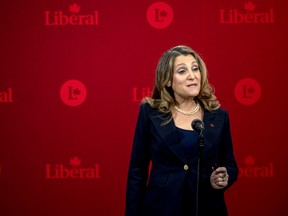
[ad_1]
With her leadership loss on the horizon, she’s taken to calling for nuclear protection against Trump

Article content
The federal Liberals will pick a new party leader and prime minister on March 9. Former Bank of Canada and Bank of England governor Mark Carney has a significant lead over his closest rival, former deputy prime minister and finance minister Chrystia Freeland. He’s been ahead by double digits since late January. A Feb. 11 Leger poll suggested the gap was an eye-popping 54 points (68 to 14 per cent).
Advertisement 2
Article content
Freeland has soldiered on. She’s attempting to defy the odds and make a miraculous comeback, but some of her comments have been unusual as of late. More than her usual fare, in fact.
“I intend to win on Sunday, and when I win, I will invite Mark to serve as finance minister in my government. I think we’ll make a great team,” Freeland triumphantly said during Wednesday’s media scrum in Vaughan, Ont. Being positive and upbeat is one thing. Since she’s trailing badly against Carney, the acknowledged frontrunner, any suggestion that she’ll put him in her cabinet makes her look delusional.
Nevertheless, it’s a tame comment compared to the bizarre statement she recently made about U.S. President Donald Trump.
During the Feb. 25 English-language leadership debate, Freeland said she wanted to build stronger ties with European allies in the North Atlantic Treaty Organization (NATO). That’s fine, but she also stated, “I would be sure that France and Britain were there, who possess nuclear weapons.” Why does this matter? “I would be working urgently with those partners to build a closer security relationship … in a time when the United States can be a threat.”
Article content
Advertisement 3
Article content
Wait, what?
That’s right. Freeland went nuclear against Trump and seemingly called for nuclear protection against him. She suggested the president is “clearly threatening our sovereignty” with calls to annex Canada, and stronger NATO ties would “guarantee our security.”
I’m sorry, but that’s completely nuts.
Tensions between Canada and the U.S. have escalated for months. They went over the edge when Trump’s 25 per cent tariffs took effect on Tuesday (only to pause them for some goods for another month two days later). Freeland’s analysis, which was shared before the tariffs became a reality, made her seem hysterical, unstable and unworthy of Canada’s next prime minister. All the qualities she likely associates with Trump.
What caused Freeland to go rogue?
One possibility is that she doesn’t want to become another casualty in political history. Those who bring down party leaders and governments, or attempt to become political white knights, are rarely rewarded with the riches they feel they’re owed.
Here are two examples.
Michael Heseltine, a longtime British Conservative MP from 1966 to 2001, helped bring down Prime Minister Margaret Thatcher’s leadership in 1990. He had previously served in Thatcher’s cabinet, but was sitting in the backbenches due to opposition to her economic views and Euroscepticism. When the deputy prime minister at the time, Geoffrey Howe, stunningly resigned on Nov. 13, 1990 in Parliament, Heseltine seized upon this opportunity. He challenged Thatcher for the party leadership, winning 152 votes (41 per cent) on the first ballot while she received 204 votes (55 per cent). It looked like Heseltine had enough momentum to beat her. Humiliated and embarrassed, Thatcher resigned.
Advertisement 4
Article content
Ironically, Heseltine received blowback on the second ballot from Conservative MPs who had supported him. He dropped to 131 votes, with many shifting to Chancellor of the Exchequer John Major. Realizing he couldn’t win, Heseltine withdrew. He went on to become deputy prime minister and first secretary of state in Major’s cabinet, but was never completely forgiven by Thatcher’s supporters for his betrayal.
There’s also Grace McCarthy, the grand dame of British Columbia’s Social Credit Party. She was first elected in 1966, and helped rebuild the Socreds after their devastating loss in the 1972 election. She worked tirelessly and increased membership from 5,000 to 70,000. She was a senior cabinet minister under then-Premier Bill Bennett when the Socreds returned to power in 1975. She helped bring Expo 86 to Vancouver, established the SkyTrain and initiated Canada’s first toll-free helpline for abused children.
For all the good work McCarthy did, her party never seemed to reciprocate. She lost the 1986 Socred leadership race to Bill Vander Zalm and finished third. When he resigned after a series of scandals in 1991, McCarthy was viewed as the frontrunner to replace him. Yet, she shockingly lost this leadership race to Rita Johnson, a Vander Zalm loyalist.
Advertisement 5
Article content
After the party was decimated in the 1991 election, Johnson resigned and McCarthy became Socred leader in 1993. She would never become premier. Instead, she lost in a byelection to Liberal Mike de Jong in the historically safe Socred riding of Matsqui the following year. Four of the six Socred MLAs defected to B.C.’s Reform Party, wiping out the Socreds’ party status. McCarthy resigned in May 1994 and exited politics for good.
Freeland played a major role in forcing Prime Minister Justin Trudeau’s resignation after he decided to shuffle her out as finance minister in favour of Carney. She was applauded for her efforts and even served as a white knight (of sorts) since the Liberals had been well behind Pierre Poilievre and the Conservatives for two years.
Alas, many of Freeland’s longtime colleagues have turned against her and supported the politically inexperienced Carney. This impending failure and forthcoming loss has clearly hit her hard. Maybe that’s why she chose to utilize the nuclear option.
National Post
Article content
